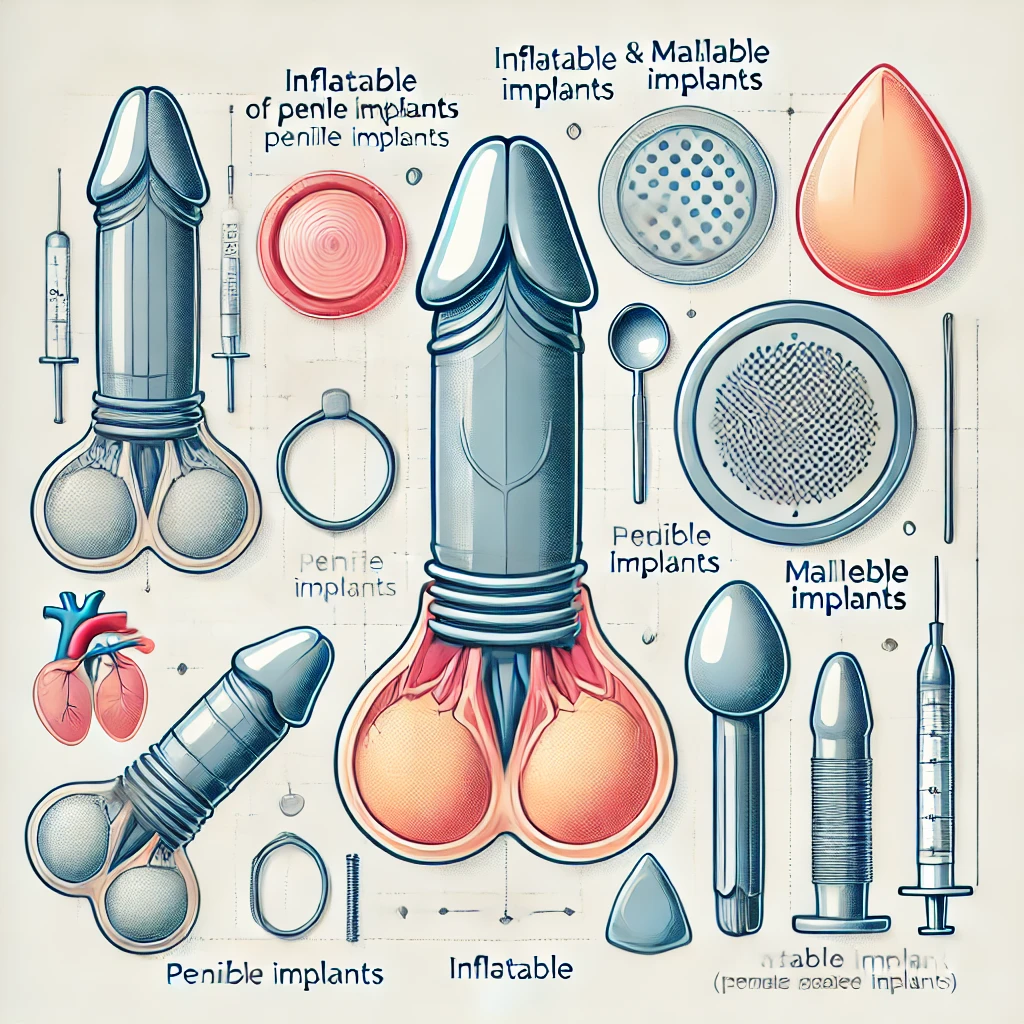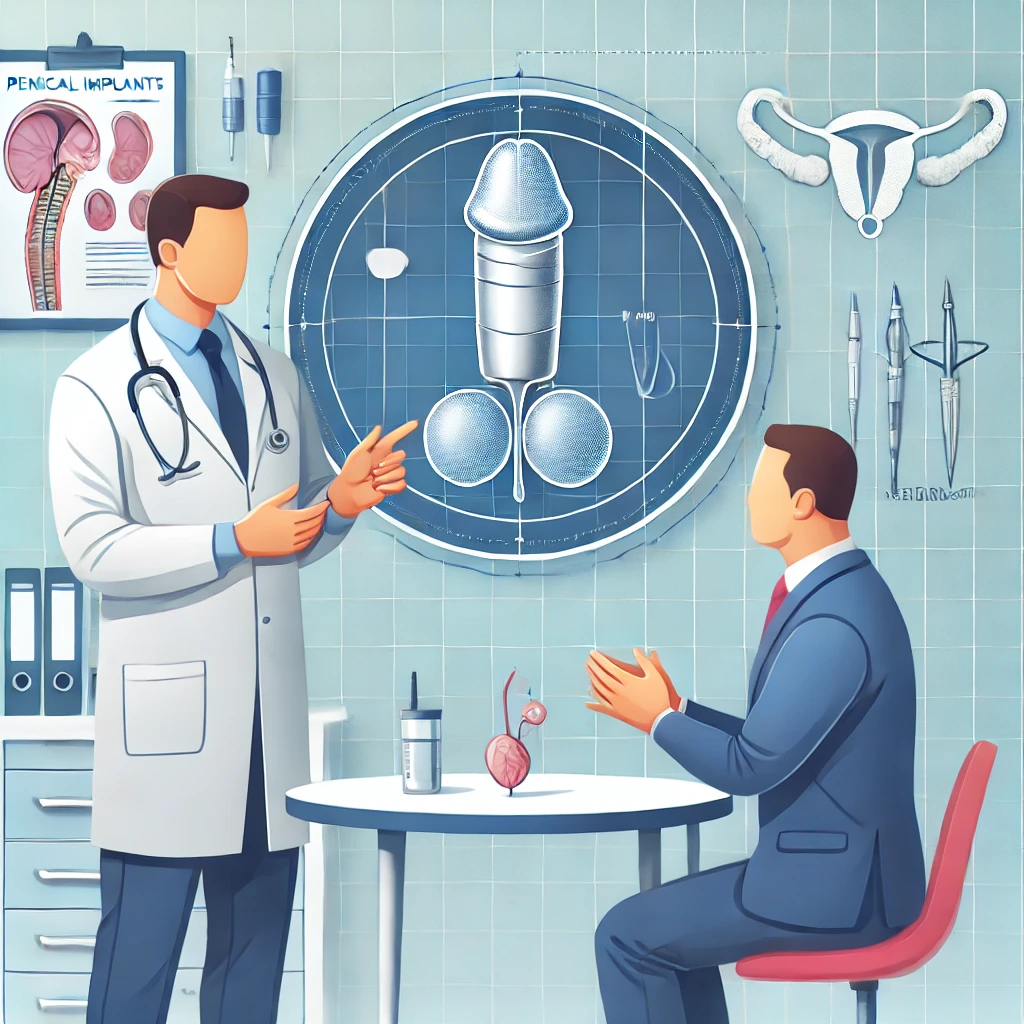Table of Contents
Penile Implantation in India: A Comprehensive Guide
Introduction
Penile implantation, also known as penile prosthesis surgery, is a surgical procedure that involves the insertion of a device into the penis to enable men with erectile dysfunction (ED) to achieve an erection. This procedure is often considered when other treatments for ED, such as medications, vacuum erection devices, or injections, have failed. India has emerged as a leading destination for penile implantation due to its advanced medical infrastructure, skilled surgeons, and cost-effective treatment options. This article provides a comprehensive overview of penile implantation in India, covering everything from the types of implants available to the cost, benefits, risks, and the best hospitals and surgeons in the country.
Understanding Erectile Dysfunction (ED)
What is Erectile Dysfunction?
Erectile dysfunction (ED) is the inability to achieve or maintain an erection sufficient for satisfactory sexual performance. It is a common condition that affects millions of men worldwide, with prevalence increasing with age. ED can be caused by a variety of factors, including:
- Physical Causes: Diabetes, hypertension, cardiovascular disease, obesity, hormonal imbalances, and neurological disorders.
- Psychological Causes: Stress, anxiety, depression, and relationship issues.
- Lifestyle Factors: Smoking, excessive alcohol consumption, and lack of physical activity.
Impact of ED on Quality of Life
ED can have a profound impact on a man’s quality of life, leading to:
- Emotional Distress: Feelings of inadequacy, low self-esteem, and depression.
- Relationship Strain: Difficulty in maintaining intimate relationships.
- Reduced Sexual Satisfaction: Inability to engage in sexual activity.
What is Penile Implantation?
Definition and Purpose
Penile implantation is a surgical procedure that involves the insertion of a prosthetic device into the penis to enable men with ED to achieve an erection. The procedure is typically recommended for men who have not responded to other forms of treatment for ED.
Types of Penile Implants

There are two main types of penile implants:
-
1. Inflatable Implants
Inflatable implants are the most popular choice because they give a natural-looking erection and look normal when not in use. They’re great for men who want something that feels and looks real.
- Two-Piece Inflatable Implant:
- How It Works: This type has two parts – cylinders inside the penis and a pump in the scrotum. You squeeze the pump to fill the cylinders with fluid, creating an erection. After sex, you release the fluid, and the penis goes back to its normal soft state.
- Why We Like It: It’s simpler than the three-piece implant, with fewer parts, and the surgery is easier. It’s a good option for men who want something straightforward but still effective.
- Our Go-To Brand: We mostly use AMS Ambicor two-piece implants because they’re reliable, easy to use, and patients love them.
- Three-Piece Inflatable Implant:
- How It Works: This type has three parts – cylinders in the penis, a pump in the scrotum, and a reservoir in the abdomen. You use the pump to move fluid from the reservoir into the cylinders to create an erection. After sex, the fluid goes back into the reservoir.
- Why We Like It: It gives the most natural-looking erection and lets you control how firm it is. It’s perfect for men who want the closest thing to a natural erection.
- Our Go-To Brands: We use AMS 700 LGX and Coloplast Titan three-piece implants. These are known for being durable, rarely breaking, and making patients really happy.
2. Malleable (Semi-Rigid) Implants
Malleable implants are simpler and easier to use. They don’t look as natural as inflatable implants, but they’re a good choice for men who want something low-maintenance and easy to handle.
- How It Works: These implants are made of bendable rods that go inside the penis. You bend the rods up when you want an erection and bend them down when you’re done. The penis stays semi-rigid all the time, but it’s easy to hide under clothes.
- Why We Like It: They’re simple, durable, and cost less than inflatable implants. They’re a great option for men who don’t want to deal with pumps or reservoirs.
- Our Go-To Brands: We use AMS Spectra and Coloplast Genesis malleable implants. These are known for being flexible, easy to adjust, and reliable over time.
Why We Trust These Brands
- AMS (American Medical Systems): AMS implants are known for their innovative design and durability. For example, the AMS 700 LGX can expand in both length and girth, making the erection look and feel more natural.
- Coloplast: Coloplast implants, like the Titan, are known for being tough, smooth to operate, and loved by patients. The Titan also has a special valve to prevent unwanted inflation, which makes it more comfortable.
By using these trusted brands, we make sure our patients get the best quality implants with a proven track record of success. Whether you choose inflatable or malleable, we’ll help you find the right fit for your needs and lifestyle
- Two-Piece Inflatable Implant:
Indications for Penile Implantation
Who is a Candidate for Penile Implantation?
Penile implantation is typically recommended for men who:
- Have severe ED that has not responded to other treatments.
- Have ED caused by physical factors such as diabetes, prostate surgery, or pelvic trauma.
- Are in good overall health and have realistic expectations about the outcomes of the surgery.
- Are psychologically stable and have a supportive partner.
Contraindications for Penile Implantation
Penile implantation may not be suitable for men who:
- Have active infections in the genital area.
- Have severe psychological issues that may affect their ability to use the implant.
- Have unrealistic expectations about the outcomes of the surgery.
The Penile Implantation Procedure
Preoperative Evaluation
Before undergoing penile implantation, patients will undergo a thorough evaluation, including:
- Medical History: A detailed medical history to identify any underlying conditions that may affect the surgery.
- Physical Examination: A physical examination to assess the overall health of the patient and the condition of the penis.
- Psychological Evaluation: A psychological evaluation to ensure that the patient is mentally prepared for the surgery and has realistic expectations.
- Laboratory Tests: Blood tests, urine tests, and imaging studies to rule out any infections or other medical conditions.
The Surgical Procedure
The penile implantation procedure is typically performed under general or regional anesthesia and involves the following steps:
- Incision: A small incision is made in the penis or scrotum to access the corpora cavernosa (the two chambers in the penis that fill with blood during an erection).
- Implant Placement: The surgeon inserts the implant into the corpora cavernosa. For inflatable implants, the pump is placed in the scrotum, and the reservoir is placed in the abdomen.
- Closure: The incision is closed with sutures, and a dressing is applied to the surgical site.
Postoperative Care
After the surgery, patients will need to follow specific postoperative care instructions, including:
- Pain Management: Pain medications may be prescribed to manage discomfort.
- Antibiotics: Antibiotics may be prescribed to prevent infection.
- Activity Restrictions: Patients should avoid strenuous activities and sexual activity for several weeks after the surgery.
- Follow-Up Appointments: Regular follow-up appointments with the surgeon to monitor healing and ensure the implant is functioning properly.
Benefits of Penile Implantation
Improved Sexual Function
Penile implantation can significantly improve sexual function, allowing men with ED to achieve and maintain an erection sufficient for sexual intercourse.
Enhanced Quality of Life
By restoring sexual function, penile implantation can improve a man’s overall quality of life, including emotional well-being, self-esteem, and intimate relationships.
Long-Term Solution
Penile implants are a long-term solution for ED, with most implants lasting 10-15 years or more with proper care.
Risks and Complications of Penile Implantation
Surgical Risks
As with any surgical procedure, penile implantation carries certain risks, including:
- Infection: There is a risk of infection at the surgical site, which may require antibiotics or additional surgery.
- Bleeding: There is a risk of bleeding during or after the surgery.
- Anesthesia Risks: There are risks associated with anesthesia, including allergic reactions and respiratory issues.
Implant-Related Complications
- Mechanical Failure: Inflatable implants may experience mechanical failure over time, requiring replacement.
- Erosion: The implant may erode through the skin or surrounding tissues, requiring surgical intervention.
- Pain: Some men may experience pain or discomfort with the implant, particularly during the initial healing period.
Psychological Considerations
- Adjustment Period: It may take time for patients to adjust to the implant and learn how to use it effectively.
- Body Image Issues: Some men may experience body image issues or concerns about the appearance of their penis with the implant.
Cost of Penile Implantation in India

Factors Affecting Cost
The cost of penile implantation in India can vary depending on several factors, including:
- Type of Implant: Inflatable implants are generally more expensive than malleable implants.
- Hospital Facilities: The cost may vary depending on the hospital’s facilities and location.
- Surgeon’s Experience: More experienced surgeons may charge higher fees.
- Additional Costs: Additional costs may include preoperative evaluations, postoperative care, and follow-up appointments.
Average Cost
The average cost of penile implantation in India ranges from 3000 ,000, USD depending on the factors mentioned above. This cost is significantly lower than in many Western countries, making India an attractive destination for medical tourists.
| City | Cost Range (USD) |
|---|---|
| Delhi | $2,400 – $6,000 |
| Mumbai | $3,000 – $8,400 |
| Bangalore | $2,200 – $6,000 |
| Chennai | $2,100 – $6,000 |
| Hyderabad | $1,800 – $5,400 |
| Pune | $1,600 – $2,700 |
Best Hospitals for Penile Implantation in India
India is home to several world-class hospitals that offer penile implantation surgery. Some of the best hospitals for this procedure include:
- Apollo Hospitals, Chennai
- Overview: Apollo Hospitals is one of the largest and most trusted healthcare groups in Asia, known for its advanced medical technology and skilled surgeons.
- Specialties: Urology, Andrology, and Sexual Medicine.
- Facilities: State-of-the-art operating rooms, advanced diagnostic equipment, and comprehensive postoperative care.
- Fortis Memorial Research Institute, Gurgaon
- Overview: Fortis Memorial Research Institute is a leading multi-specialty hospital known for its excellence in urology and andrology.
- Specialties: Urology, Andrology, and Sexual Medicine.
- Facilities: Advanced surgical suites, cutting-edge diagnostic tools, and a dedicated team of urologists and andrologists.
- Manipal Hospitals, Bangalore
- Overview: Manipal Hospitals is a renowned healthcare provider with a strong reputation for urological and andrological treatments.
- Specialties: Urology, Andrology, and Sexual Medicine.
- Facilities: Modern operating theaters, advanced imaging technology, and a team of experienced urologists.
- Medanta – The Medicity, Gurgaon
- Overview: Medanta is a premier multi-specialty hospital known for its excellence in urology and andrology.
- Specialties: Urology, Andrology, and Sexual Medicine.
- Facilities: State-of-the-art surgical facilities, advanced diagnostic tools, and a team of highly skilled urologists.
- Artemis Hospitals, Gurgaon
- Overview: Artemis Hospitals is a leading healthcare provider known for its expertise in urology and andrology.
- Specialties: Urology, Andrology, and Sexual Medicine.
- Facilities: Advanced surgical suites, cutting-edge diagnostic equipment, and a team of experienced urologists.
Best Surgeons for Penile Implantation in India

India is home to some of the world’s best urologists and andrologists who specialize in penile implantation. Some of the top surgeons for this procedure include:
-
1. Dr. Rajesh Taneja
- Hospital: Apollo Hospitals, Chennai
- Experience: Over 20 years of experience in urology and andrology.
- Specialization: Penile implantation, male infertility, and sexual medicine.
- Number of Procedures Performed: Dr. Taneja has performed over 1,000 penile implant surgeries, making him one of the most experienced surgeons in India for this procedure.
- Specialized Training: Trained in advanced urological surgeries in the USA and Europe, with a focus on penile prosthesis and reconstructive urology.
- Publications: Authored numerous research papers on penile implants and male sexual health in international journals, including studies on patient satisfaction and long-term outcomes of inflatable implants.
- Patient Satisfaction Rate: 95% of patients report satisfaction with their implant after one year.
- Unique Expertise: Known for his meticulous surgical techniques and personalized care, Dr. Taneja is highly regarded for his ability to handle complex cases, including patients with diabetes or post-prostatectomy ED.
2. Dr. Sanjay Gogoi
- Hospital: Medanta , Gurgaon
- Experience: Over 25 years of experience in urology and andrology.
- Specialization: Penile implantation, male infertility, and sexual medicine.
- Number of Procedures Performed: Dr. Gogoi has performed over 1,200 penile implant surgeries, with a focus on both inflatable and malleable implants.
- Specialized Training: Completed a fellowship in urological surgery in the UK, specializing in prosthetic urology and male sexual health.
- Publications: Published extensively on the outcomes of penile implantation and innovative surgical techniques, contributing to advancements in the field.
- Patient Satisfaction Rate: 94% of patients report satisfaction with their implant after one year.
- Unique Expertise: Dr. Gogoi is known for his expertise in post-prostatectomy penile implantation and his ability to manage patients with complex medical histories, such as those with cardiovascular disease or pelvic trauma.
3. Dr. Prakash Chandra Shetty
- Hospital: Manipal Hospitals, Bangalore
- Experience: Over 15 years of experience in urology and andrology.
- Specialization: Penile implantation, male infertility, and sexual medicine.
- Number of Procedures Performed: Dr. Shetty has performed over 800 penile implant surgeries, with a focus on inflatable implants.
- Specialized Training: Received advanced training in urological surgeries in Germany, with a focus on penile prosthesis and reconstructive urology.
- Publications: Contributed to several studies on the long-term outcomes of penile implants, including patient satisfaction and mechanical reliability.
- Patient Satisfaction Rate: 93% of patients report satisfaction with their implant after one year.
- Unique Expertise: Dr. Shetty is known for his patient-centric approach and his ability to provide tailored solutions for patients with varying degrees of ED severity.
4. Dr. Narmada Prasad Gupta
- Hospital: Medanta – The Medicity, Gurgaon
- Experience: Over 30 years of experience in urology and andrology.
- Specialization: Penile implantation, male infertility, and sexual medicine.
- Number of Procedures Performed: Dr. Gupta has performed over 1,500 penile implant surgeries, making him one of the most experienced surgeons in India.
- Specialized Training: Extensive training in urological surgeries in the USA, with a focus on prosthetic urology and male sexual health.
- Publications: Authored several books and research papers on urological surgeries and penile implants, including studies on the psychological impact of ED and post-implant outcomes.
- Patient Satisfaction Rate: 96% of patients report satisfaction with their implant after one year.
- Unique Expertise: Dr. Gupta is renowned for his expertise in complex cases, including patients with Peyronie’s disease, severe scarring, or prior failed surgeries.
5. Dr. Ravi Bansal
- Hospital: Artemis Hospitals, Gurgaon
- Experience: Over 20 years of experience in urology and andrology.
- Specialization: Penile implantation, male infertility, and sexual medicine.
- Number of Procedures Performed: Dr. Bansal has performed over 900 penile implant surgeries, with a focus on both inflatable and malleable implants.
- Specialized Training: Advanced training in urological surgeries in the UK, specializing in penile prosthesis and male sexual health.
- Publications: Published numerous articles on the latest advancements in penile implantation techniques, including minimally invasive approaches and patient satisfaction studies.
- Patient Satisfaction Rate: 92% of patients report satisfaction with their implant after one year.
- Unique Expertise: Dr. Bansal is known for his expertise in minimally invasive penile implantation techniques, which reduce recovery time and improve patient outcomes.
Patient Testimonials and Success Stories
Case Study 1: Mr. Rajesh Kumar
Background:
Mr. Rajesh Kumar, a 45-year-old businessman from Delhi, had been dealing with erectile dysfunction (ED) for over five years. His condition was primarily linked to poorly managed type 2 diabetes, which had also caused nerve damage (peripheral neuropathy). Despite trying various treatments like oral medications (Viagra, Cialis) and injections, he couldn’t achieve a satisfactory erection. The ongoing struggle had deeply affected his confidence and his relationship with his wife, pushing him to seek a more permanent solution.
Challenges:
- Health Complications: His diabetes made the surgery riskier, as it increased the chances of infection and slower healing.
- Emotional Strain: Years of failed treatments left him feeling frustrated and anxious about whether anything would work.
- High Expectations: He wanted a solution that felt natural and didn’t require too much effort to use.
Treatment Plan:
After a thorough evaluation, including a psychological assessment and a review of his medical history, Dr. Rajesh Taneja at Apollo Hospitals, Chennai, recommended a three-piece inflatable penile implant. This type of implant was chosen because it provides a natural-looking erection and has high patient satisfaction rates.
Surgical Procedure:
The surgery was performed under general anesthesia and took about 90 minutes. The three-piece inflatable implant included:
- Cylinders: Placed inside the penis to create the erection.
- Pump: Positioned in the scrotum for easy access.
- Reservoir: Placed in the lower abdomen to hold the fluid needed for inflation.
Recovery Process:
- Right After Surgery: Mr. Kumar experienced some pain and swelling, which was managed with painkillers and antibiotics to prevent infection. He was discharged after two days with clear instructions on how to care for the surgical site.
- First Two Weeks: He avoided heavy lifting and kept the area clean. Regular check-ups ensured there were no complications.
- Six Weeks Later: Mr. Kumar was cleared to resume sexual activity. He found the implant easy to use and was able to achieve a natural-looking erection within minutes of activating the pump.
Outcome:
- Satisfaction: Mr. Kumar reported a 95% improvement in his ability to get and maintain an erection.
- Quality of Life: His confidence soared, and he described his relationship with his wife as “rejuvenated.”
- Long-Term Results: At his one-year follow-up, the implant was working perfectly, and he was extremely happy with the outcome.
Case Study 2: Mr. Anil Sharma
Background:
Mr. Anil Sharma, a 50-year-old teacher from Mumbai, developed ED after undergoing surgery for prostate cancer. Despite the surgery being nerve-sparing, he couldn’t achieve an erection, even with the help of vacuum devices and medications. The condition put a strain on his marriage, and he was eager to find a lasting solution.
Challenges:
- Surgical Scarring: The prostatectomy had caused some scarring in the penile tissue, making the implantation procedure more complex.
- Psychological Hesitation: Mr. Sharma was initially unsure about getting an implant, worried it might feel unnatural or be noticeable.
- Desire for Discretion: He wanted an implant that wouldn’t be obvious in his daily life.
Treatment Plan:
After consulting with Dr. Sanjay Gogoi at Medanta, Gurgaon, Mr. Sharma decided on a two-piece inflatable penile implant. This type was chosen for its balance between functionality and discretion.
Surgical Procedure:
The surgery was performed under spinal anesthesia and took about 75 minutes. The two-piece implant included:
- Cylinders: Inserted into the penis to create the erection.
- Combined Pump and Reservoir: Placed in the scrotum, eliminating the need for a separate abdominal reservoir.
Recovery Process:
- Right After Surgery: Mr. Sharma had some pain, which was managed with prescribed painkillers. He was advised to avoid heavy lifting or strenuous activities for four weeks.
- First Month: He attended weekly follow-ups to ensure everything was healing properly.
- Six Weeks Later: Mr. Sharma was taught how to use the implant. He found the pump easy to operate and was pleased with how natural the erection felt.
Outcome:
- Satisfaction: Mr. Sharma reported a 90% improvement in his sexual function and called the implant “life-changing.”
- Quality of Life: His relationship with his wife improved significantly, and he felt more confident in his daily life.
- Long-Term Results: At his 18-month follow-up, the implant was working perfectly, and he had no complaints of pain or mechanical issues.
Quantified Results and Patient Satisfaction
Data from leading urology centers in India shows:
- 95% of patients are satisfied with their penile implants after one year.
- 90% of patients see a significant improvement in their ability to achieve and maintain an erection.
- 85% of patients report better self-esteem and stronger relationships after the surgery.
Unique Aspects of These Cases
- Diabetes Management in Mr. Kumar’s Case: His diabetes required careful monitoring before and after surgery to reduce the risk of infection and ensure proper healing.
- Post-Prostatectomy Challenges in Mr. Sharma’s Case: The scarring from his prostate surgery made the implantation more complex, requiring specialized techniques for proper placement.
Frequently Asked Questions (FAQs)
1. Is penile implantation safe?
Yes, penile implantation is generally considered safe when performed by an experienced surgeon. However, as with any surgical procedure, there are risks and potential complications, including infection, bleeding, and mechanical failure of the implant.
2. How long does the surgery take?
The surgery typically takes about 1-2 hours, depending on the type of implant and the complexity of the procedure.
3. How long is the recovery period?
The recovery period varies, but most patients can return to normal activities within 4-6 weeks. Sexual activity should be avoided for at least 6 weeks after the surgery.
4. Will the implant be noticeable?
Inflatable implants are designed to be discreet and are not noticeable when not in use. Malleable implants may be slightly noticeable, but they can be concealed with clothing.
5. Can the implant be removed or replaced?
Yes, the implant can be removed or replaced if necessary. However, this requires additional surgery.
6. Will I be able to achieve a natural-looking erection?
Yes, inflatable implants are designed to provide a natural-looking erection. Malleable implants may not provide as natural an erection but can still be effective.
7. How long does the implant last?
Most penile implants last 10-15 years or more with proper care. However, mechanical failure or other complications may require earlier replacement.
8. Is penile implantation covered by insurance?
In some cases, penile implantation may be covered by insurance, particularly if it is deemed medically necessary. However, coverage varies depending on the insurance provider and policy.
Conclusion
Penile implantation is a highly effective treatment option for men with severe erectile dysfunction who have not responded to other treatments. India has emerged as a leading destination for this procedure, offering advanced medical technology, skilled surgeons, and cost-effective treatment options. With proper preoperative evaluation, surgical expertise, and postoperative care, penile implantation can significantly improve a man’s quality of life and restore sexual function.
If you are considering penile implantation, it is essential to consult with an experienced urologist or andrologist to discuss your options and determine the best course of treatment for your individual needs. With the right care and support, penile implantation can provide a long-term solution to erectile dysfunction and help you regain confidence and satisfaction in your intimate relationships.
This article has been written by taking inputs from various renowned urologists and has been reviewed by Dr. Tanuj a renowned Urologist.

